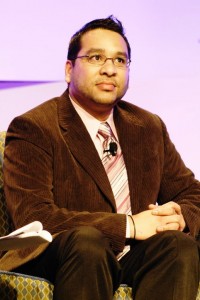LGBT Muslims may face a difficult balance between sexuality and religion. The mainstream interpretation of the Islamic holy book, the Quran, condemns homosexuality. Faisal Alam, the founder of Al-Fatiha, a Muslim LGBT group that works to help LGBT Muslims deal with their struggles with their faith and their sexual orientation, has traveled to colleges and universities across the country to deliver presentations about LGBT Muslims.

Alam addressed the campus community Wednesday afternoon in the Campus Center’s Klingenstein Lounge. Staff Writer TinaMarie Craven spoke with Alam concerning his activism and personal experiences.
TinaMarie Craven: Why did you start Al-Fatiha?
Faisal Alam: It was an organization that started in 1998, and it was through my own process of trying to reconcile my sexual orientation with my faith of Islam, and when I looked for resources online, I could not find anything that was positive for lesbian and gay Muslims. The organization sort of started by accident in that I organized a retreat for LGBT Muslims in October of 1998. The name Al-Fatiha comes from the first chapter of the Quran, and it means the opening or the beginning, and that was the theme of this retreat that we had brought over 40 people from six different countries. Many of these people had not met other LGBT people before, and so it was after that really historic gathering, its first gathering of LGBT Muslims, that the group of us decided that we needed to form an actual entity — an organization to provide support for LGBT Muslims who are trying to reconcile these two identities that oftentimes we are told are irreconcilable.
TC: Could you describe your coming out experience?
FA: I was doing organizing and activism. It started when I was 19, and I never really came out to my parents, so I was kind of naïve to kind of doing this activism and thinking it wasn’t going to get back to them. The first time a mainstream paper wanted to do an article on gay Muslims was The New York Times, which was in 1999. You know I was naïve, and I said, “Oh, you know, who reads The New York Times?” Well, of course the whole world reads The New York Times. My mom was the first person who found out, so I was kind of outed to my parents through my exposure within the media. It was really, really difficult for them because not only was I coming out, but I was [also] telling the whole world about it, and I was telling the world that it was OK to be gay and be Muslim. This is only 13 years ago, and there was only one or two of us in the country who were willing to have their photograph taken publicly or have media interviews. That’s radically changed in those 13 years, but at the time there really wasn’t anyone else who was doing this kind of work. So my parents have gone through a lot of difficulty, and I think they are more in a tolerant stage than they are accepting necessarily. They understand that what I do is important and that it’s important to me, but I think that their concern is why I have to be public about it. What concerns them is what other people are going to say about status within your community or within your mosque, and those are the concerns that really affected them.
TC: How did others react after The New York Times outed you?
FA: I was involved with a lot of Muslim organizations, and I was basically asked to resign from all of these organizations, which was really a traumatic experience because I literally sort of lost my community overnight. But, in the process, I found a new community of LGBT Muslims who were more welcoming or open, and our mission really is to help individuals figure out how to bridge these two conflicting ideas that we were taught for the past 14,000 years are wrong.
TC: What do you say to LGBT Muslims when they are struggling with their faith and sexual orientation?
FA: Well, I think the first thing is for them to understand that they’re not alone because a lot of people really feel isolated — they feel that they are the only ones in the world. They’re not alone. Their god still loves them and accepts them and even though they’re going to have a lot of difficulties. The attitudes in mainstream Muslim communities are really beginning to change.








